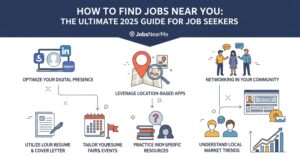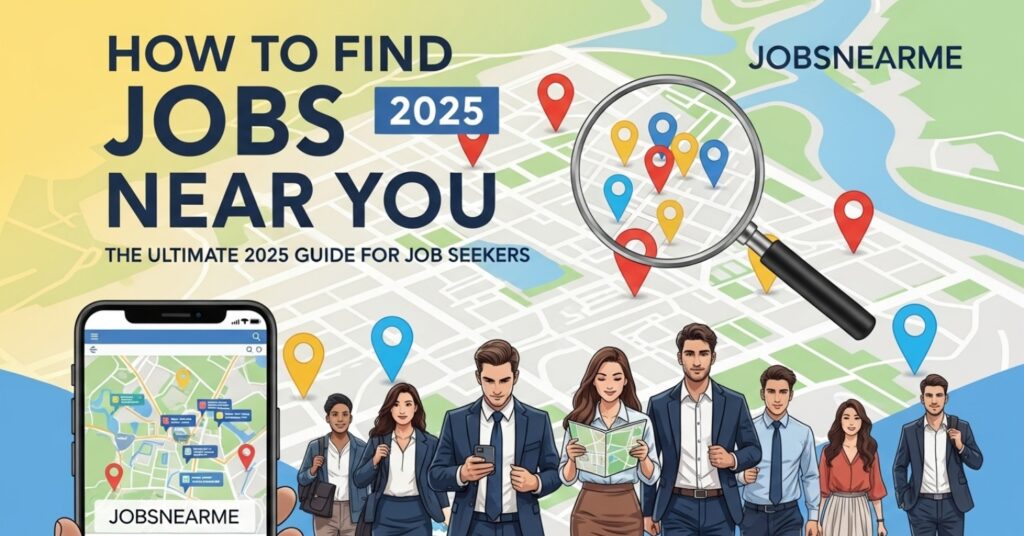Finding the right job in today’s competitive market requires more than just browsing job boards. Whether you’re searching for urgent jobs in the USA, seeking female-friendly opportunities in Canada, or exploring private sector positions in the UK and Australia, this comprehensive guide will help you navigate the modern job search landscape effectively.
Understanding Today’s Job Market Landscape
The job market has transformed dramatically over the past few years. Remote work opportunities have expanded globally, while local businesses are actively hiring to meet growing demand. According to recent employment data, job seekers who use multiple search strategies are 40% more likely to land interviews within the first month of their search.
Why Location-Based Job Searching Matters
When you search for “jobs near me” or “jobs hiring near me,” you’re tapping into a specific advantage. Local employers often prefer candidates who can start immediately and don’t require relocation assistance. This is particularly true for urgent hiring situations where companies need to fill positions quickly.
Essential Job Search Strategies That Actually Work

1. Master the Art of Digital Job Searching
Your online presence is your digital first impression. Here’s how to optimize it:
LinkedIn Optimization:
- Use a professional headshot
- Write a compelling headline that includes your target job keywords
- Craft a summary that tells your professional story
- Connect with industry professionals in your area
Resume Tailoring:
- Customize your resume for each application
- Use keywords from the job description
- Highlight relevant local experience
- Include measurable achievements with specific numbers
2. Leverage Local Job Search Platforms
Different regions have preferred job platforms:
For USA Job Seekers:
- Indeed remains the most comprehensive platform
- LinkedIn Jobs for professional positions
- ZipRecruiter for quick applications
- Local newspaper job sections still matter
For UK Opportunities:
- Reed.co.uk for diverse industries
- Totaljobs.com for comprehensive listings
- CV-Library for quick matches
For Canadian Markets:
- Job Bank (government portal)
- Workopolis for private sector roles
- Monster.ca for international companies
For Australian Positions:
- Seek.com.au dominates the market
- CareerOne for specialized roles
- Jora for entry-level positions
3. Network Strategically in Your Local Area
Networking isn’t just about attending events—it’s about building genuine professional relationships.
Effective Networking Approaches:
- Join local professional associations
- Attend industry meetups and conferences
- Participate in community volunteering
- Connect with alumni in your area
- Engage with local business groups on social media
Finding Urgent Jobs: Speed and Strategy Combined

When you need employment immediately, certain strategies can accelerate your job search:
Quick Application Techniques
Same-Day Application Strategy:
- Set up job alerts for urgent positions
- Prepare multiple versions of your resume
- Have references ready to contact
- Practice common interview questions
Industries with Frequent Urgent Hiring:
- Healthcare and caregiving
- Hospitality and food service
- Retail and customer service
- Transportation and logistics
- Temporary staffing agencies
Understanding Gender-Specific Job Markets
While all jobs should be accessible to everyone, certain industries actively seek to improve gender diversity:
Female-Friendly Industries Expanding:
- Technology and software development
- Healthcare and medical research
- Financial services and banking
- Education and training
- Government and public service
Companies Actively Promoting Diversity:
- Look for employers with diversity certifications
- Research companies with female leadership
- Check for family-friendly policies
- Investigate flexible work arrangements
Private Sector vs. Public Sector: Making the Right Choice
Understanding the differences between private and public sector employment helps you target your search effectively.
Private Sector Advantages
Benefits of Private Employment:
- Potentially higher salaries
- Performance-based bonuses
- Faster promotion opportunities
- Innovation-focused environments
- Flexible work arrangements
Where to Find Private Sector Jobs:
- Company websites directly
- Professional recruiting firms
- Industry-specific job boards
- Executive search consultants
Public Sector Opportunities
Government Job Benefits:
- Job security and stability
- Comprehensive benefits packages
- Structured career progression
- Work-life balance emphasis
- Pension plans and retirement benefits
Regional Job Search Strategies
United States Job Market
The US job market varies significantly by region. Tech jobs concentrate in Silicon Valley and Seattle, while financial positions dominate New York. Manufacturing opportunities are strongest in the Midwest.
Key US Job Search Tips:
- Research state-specific job requirements
- Understand visa implications if you’re international
- Consider cost of living variations
- Network within specific metro areas
United Kingdom Employment Landscape
The UK job market is centered around major cities, with London leading in financial services and Manchester growing in technology.
UK-Specific Strategies:
- Understand the points-based immigration system
- Research sector-specific skill shortages
- Consider apprenticeship programs
- Network through professional bodies
Canadian Job Opportunities
Canada actively seeks skilled workers through various immigration programs, making it attractive for international job seekers.
Canadian Job Search Focus:
- Explore Provincial Nominee Programs
- Research French language requirements in Quebec
- Understand credential recognition processes
- Connect with settlement agencies
Australian Employment Market
Australia’s job market is robust, with strong demand in healthcare, technology, and trades.
Australian Job Search Tactics:
- Research skill shortage lists
- Consider regional vs. metropolitan opportunities
- Understand working holiday visa options
- Network through professional associations
Advanced Job Search Techniques
Using Social Media Beyond LinkedIn
Twitter Job Searching:
- Follow industry hashtags
- Engage with company accounts
- Share relevant industry content
- Connect with recruiters and hiring managers
Facebook Job Groups:
- Join local job search groups
- Participate in industry-specific communities
- Follow company pages for updates
- Share your expertise through valuable comments
The Hidden Job Market
Research shows that 70% of jobs are never publicly advertised. Accessing this hidden market requires proactive strategies:
Uncovering Hidden Opportunities:
- Directly contact companies you want to work for
- Attend industry conferences and trade shows
- Build relationships with executive recruiters
- Follow up on informational interviews
Optimizing Your Application Materials
Resume Best Practices for 2025
Modern Resume Essentials:
- Use applicant tracking system (ATS) friendly formats
- Include relevant keywords naturally
- Quantify achievements with specific metrics
- Keep formatting clean and professional
- Tailor content for each application
Cover Letter Strategies That Work
Despite rumors of their demise, cover letters remain important for many positions:
Effective Cover Letter Structure:
- Hook the reader with your opening line
- Demonstrate knowledge of the company
- Connect your experience to their needs
- Show enthusiasm for the specific role
- Include a clear call to action
Interview Preparation and Success
Research Techniques
Company Research Checklist:
- Recent news and press releases
- Company culture and values
- Key leadership team members
- Recent product launches or services
- Competitor landscape analysis
Common Interview Questions by Region
Different cultures emphasize different interview styles:
US Interview Focus:
- Achievement-oriented questions
- Behavioral interview techniques
- Salary negotiation discussions
- Cultural fit assessment
UK Interview Approach:
- Competency-based questions
- Professional qualification discussions
- Career development planning
- Work-life balance considerations
Salary Negotiation Across Different Markets
Understanding Regional Salary Expectations
Research Tools for Salary Information:
- Glassdoor for company-specific data
- PayScale for role-based comparisons
- LinkedIn Salary Insights
- Government labor statistics
- Professional association surveys
Negotiation Strategies by Market
US Negotiation Culture:
- Direct salary discussions are expected
- Multiple rounds of negotiation are common
- Benefits packages are negotiable
- Stock options may be available
European Negotiation Approach:
- More structured salary bands
- Benefits are often standardized
- Holiday time may be more negotiable
- Professional development opportunities
Building Long-Term Career Success
Career Development Planning
Creating Your Five-Year Plan:
- Identify skills gaps in your target roles
- Research industry growth projections
- Plan for continuing education needs
- Build a professional development budget
- Establish mentorship relationships
Staying Competitive in Your Field
Continuous Learning Strategies:
- Pursue relevant certifications
- Attend industry conferences
- Join professional associations
- Participate in online learning platforms
- Volunteer for challenging projects
Avoiding Common Job Search Mistakes
Application Mistakes to Avoid
Common Pitfalls:
- Applying to every job without targeting
- Using generic cover letters
- Neglecting to follow up after interviews
- Failing to research company culture
- Not preparing questions for interviewers
Social Media Pitfalls
Protecting Your Online Reputation:
- Review privacy settings across all platforms
- Remove inappropriate photos or posts
- Ensure consistency in professional information
- Use professional email addresses
- Monitor your online presence regularly
Special Considerations for International Job Seekers
Visa and Work Permit Requirements
Key Documentation:
- Research visa requirements early
- Understand processing timelines
- Prepare financial documentation
- Gather educational credentials
- Obtain professional references
Cultural Adaptation Strategies
Workplace Culture Research:
- Communication styles vary by region
- Meeting etiquette differs across cultures
- Dress codes may vary significantly
- Work-life balance expectations differ
- Professional relationship building varies
Future-Proofing Your Career
Emerging Job Markets
Growing Industries to Watch:
- Artificial intelligence and machine learning
- Renewable energy and sustainability
- Healthcare technology and telemedicine
- Cybersecurity and data protection
- Elder care and aging services
Skills That Will Remain Valuable
Timeless Professional Skills:
- Critical thinking and problem-solving
- Emotional intelligence and empathy
- Adaptability and flexibility
- Communication and collaboration
- Leadership and team management
Your Next Steps to Employment Success
Finding the right job requires a strategic approach that combines traditional methods with modern digital techniques. Whether you’re searching for urgent employment, exploring opportunities in specific countries, or targeting particular sectors, success comes from understanding your market and presenting yourself effectively.
Remember that job searching is a full-time job in itself. Dedicate adequate time each day to applications, networking, and skill development. Stay persistent, remain flexible, and don’t be afraid to pivot your strategy based on market feedback.
The job market continues to evolve rapidly, with new opportunities emerging regularly. By staying informed about industry trends, maintaining a strong professional network, and continuously developing your skills, you’ll be well-positioned to find not just any job, but the right job for your career goals.
Start implementing these strategies today, and remember that every application and networking conversation brings you one step closer to your ideal position. Good luck with your job search journey!



